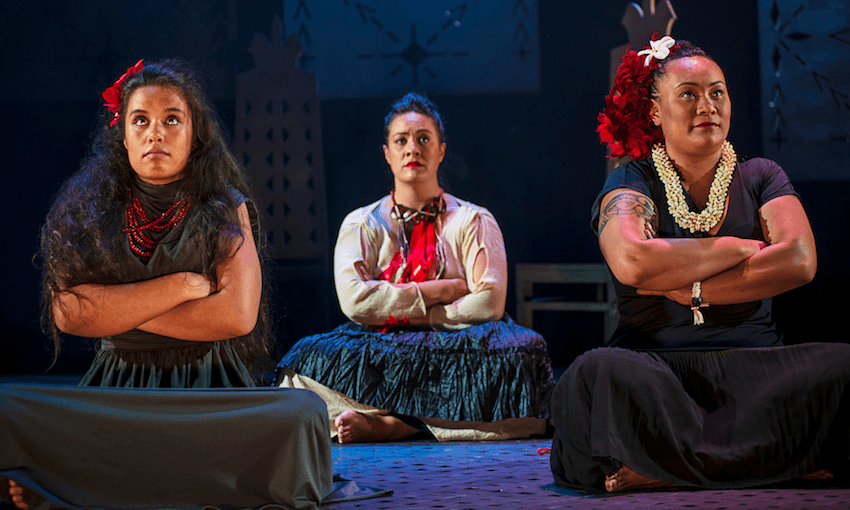In a stunning new run of Wild Dogs Under My Skirt, Samoan women are allowed to be whole, writes Madeleine Chapman.
I had two mums growing up. There was Pani (pronounced “Bunny”), my mum, who spoke Samoan on the phone to her sisters for hours, howling with laughter, yet seemed angry all the time. She could silence you with a stare and, when that didn’t work, a wooden spoon. And there was Pani (pronounced “Par-knee”), my mum, who went to private school dinners and barely spoke but laughed along politely when someone pointed out that she’d taken her shoes off at the door how cute!
Both women were Samoan and both women were real. But like so many Samoan women, my mum had different iterations for different societies. When I watched my palagi friends’ mums yell at them at home, and then yell the same way while out with friends, I realised that there was only one of them. They were allowed to be the same at home, at work, everywhere.
In Wild Dogs Under My Skirt, writer Tusiata Avia and director Anapela Polata’ivao allow six Samoan women to be the same.
The play is based on 17 poems by Avia. The poems, from Avia’s collection by the same name, all relate to the experience of being a Samoan woman, and the many forms that being takes. There are six characters in the show, broadly encompassing the different roles and personas that Samoan women adopt, publicly and privately. Six views on tradition. Six views, some deliberately and heartbreakingly not yet fully formed, on sexuality. Six views on womanhood.
From the first chorus of “a’e!”, it’s clear these are real Samoan women. They cut their lawns with sapelus (machetes), they decorate their lounges with plastic vines, and they speak frankly about the violence they’ve experienced. But it’s hilarious. It’s funny because Samoan women are funny. They have to be. It would take something truly shocking, and said in just the right way, to turn that laughter into sorrow. It’s in this impossibly small space that Wild Dogs Under My Skirt operates.
The stories heard on stage are no surprise to Samoan women, even the gently mocked afakasi ones like myself. I have heard the stories before. The finer details may be different but the driving forces are the same. I heard them in the kitchen, eating breakfast before school. I heard them in the car on the way to church. But mostly, I heard them at family reunions. After lotu, in discussions that were equal parts comedy roast and reflection.
Sometimes when my mum and her sisters hear stories about their past anger or experiences, they don’t believe them. Not figuratively, but literally. They genuinely don’t believe they happened. 50 years and 3000 kms, that’s what it takes for the normal to become shocking.
In the theatre, as I hear the funny beginnings of a story, I know what’s coming. The biggest Samoan laughs come from pain, and the crowd is laughing. Alofa (masterfully inhabited by Joanna Mika-Toloa) is confident, sexy, and hilarious. She knows what she wants and she gets it, and the audience loves it. When the inevitable turn comes, always abrupt, always so matter of fact, people audibly gasp. For the first time at a show, I’m acutely aware of the audience’s presence. An audience largely made up of people who didn’t grow up witnessing or hearing hilarious stories involving violence and trauma.
By the end of the play, there’s a hesitancy to laugh. When anger is just around the corner, you don’t want to be caught laughing at the wrong time. But you have to. There’s no self pity. Those words don’t exist in the vocabularies of these women or the thousands of women they represent. Some might leave the theatre thinking they have heard the stories of victims. To do so would be to underestimate the power of the Samoan woman. These stories, harrowing as they may sound to hear them cold, are not the defining stories of these women’s lives. They are simply stories. This happened and now here I am, stronger, still going.
Anger comes fast and easy to a Samoan woman because every emotion can be anger. A young woman (Saane Green) is confused about what was done to her, and is angry. Another (Stacey Leilua) distances herself from her homeland by sleeping with white men, and is angry, or at least apathetic. Polata’ivao gives one of the greatest acting performances in recent times as the village pa’umuku (slut). Her rage and sexuality are one and the same. She’s unapologetic, abrasive, and hurt.
Both Avia and Polata’ivao have said the poems and the play are a way to put three-dimensional Pasifika women on stage. Samoan women are not simply mannequins for hula skirts and coconut bras. They’re not still, smiling back and forth on the dashboard of a 2002 Toyota Corolla. They have lived many lives simultaneously, drawing from each as they form a new one in Niu Sila. Wild Dogs Under My Skirt presents these women whole and demands that they be seen in all their beauty and flaws. One can only hope that when the audience members leave the theatre and encounter Samoan women being the same, living unapologetically in the real world, they will respond as warmly.
Towards the end of the play, we see the anger. All six women eventually, finally, release their power in its rawest form. It is as confronting and uncomfortable as we deserve, but you can’t look away. All too soon the anger becomes silence, and the silence is long.
Wild Dogs Under My Skirt runs from March 5 to March 11 at Q Theatre. Buy tickets here.
